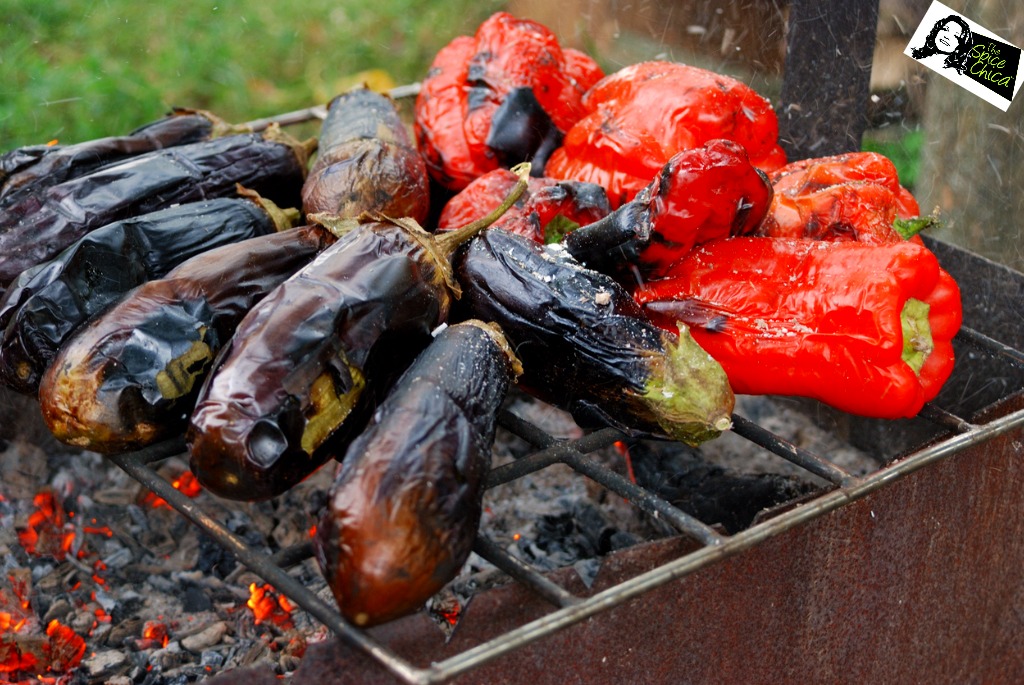Once you know how to roast an eggplant, there are a number of dishes you can make with it. I prefer roasting eggplants on the gas stove or grill. Roasting on an open flame imparts a delicate smoky flavor into the eggplant flesh. If you do not have a gas stove, you can also roast it in the oven.
Roasting Eggplant on a Range:
Wash and dry eggplant. Pierce it a few times with a fork to vent. Important – for any of the cooking methods outlined below, make sure you pierce with a fork, otherwise you could end up with an exploded eggplant!
If you have a gas range, you can roast it directly on top of the range. You might wish to protect your gas range burner with a layer of foil, which makes for easier cleanup. The eggplant will weep a bit as it roasts, leaving charred bits and goop on the range.
Place eggplant directly on top of the gas range grate,turn the flame to medium.
Allow eggplant to roast over the flame for 20-30 minutes, giving it a quarter every 5 minutes as it cooks. The larger the eggplant, the longer it will take to roast. Smaller eggplants (like Japanese eggplants) will roast faster. When finished cooking, remove from oven and proceed to “Peeling Your Eggplant.” (below).
If using a grill, light gas or coals and preheat the grill to medium heat before you begin to roast. Allow eggplant to roast over the flame for 20-30 minutes, giving it a quarter every 5 minutes as it cooks. The larger the eggplant, the longer it will take to roast. When eggplant is tender and collapsing, remove from grill and proceed to "Peeling Your Roasted Eggplant." Place a rack 8-9 inches beneath your oven's broiler and preheat the broiler. Lightly grease a baking sheet with cooking oil. Wash and dry eggplant, then pierce a few times with a fork to vent. Place on a baking sheet under the broiler and let the eggplant roast for 20-30 minutes, giving a quarter turn every 5-7 minutes. Eggplant is finished roasting when it is soft, tender and collapsing. Remove from oven and proceed to "Peeling Your Roasted Eggplant."
Peeling Your Roasted Eggplant: Once the eggplant is very tender and collapsing, remove from heat with tongs and place it on a cutting board.
There will be some residual smoky juice that collects on the board; you can drain it off or blend it into the eggplant, depending on the flavor you want to achieve.
Slice the eggplant open. Scoop out the roasted pulpy flesh and place it in a bowl. Discard the charred skin. The eggplant will be quite soft, and you may need to peel off a few small bits of skin by hand. I’m not super careful about it; I find that a few charred bits actually enhance the smoky flavor, which we find desirable.
Once the eggplant is separated from the charred skin, you are left with perfectly tender, roasted and smoky eggplant flesh, which can be used to make baba ghanoush or a variety of purees and dips.
Eggplant Roasting Tips:
- Depending on where you live and what kind of eggplants you are cooking, you may from time to time encounter a bitter tasting eggplant. This is because as eggplants mature, they become richer in alkaloids, which cause a bitter flavor. Some people don’t mind this bitter flavor; others dislike it. If you are concerned about bitterness, there are a few ways to combat the issue:
- 1) If you are concerned about bitterness, choose smaller, younger eggplants for roasting. The younger and more slender the eggplant is, the less bitter and stringy it will be.
- 2) If you slice the eggplant in half prior to roasting, you can salt each half to combat bitterness. Sprinkle an even layer of salt across the white flesh. Let the eggplant sit for 30 minutes. Liquid droplets will form on top of the flesh. Rinse off this liquid, which can contain bitterness. Pat dry. Proceed with roasting.
- 3) If you slice the eggplant in half prior to roasting, there may be some large visible seeds inside. You can scrape out the largest ones using a small spoon; these larger seeds tend to hold bitterness.
- 4) After roasting, remove the eggplant pulp and let it rest in a bowl for at least 30 minutes. A smoky liquid will collect in the bowl. Taste the liquid; if it has a bitter taste to it, drain the liquid and discard before proceeding with your recipe.
We prefer to roast the eggplant whole (it produces a smokier more charred result), keep some of the smoky juice from the roasting and add it to whatever dish I’m making—it imparts fantastic flavor to dips like baba ghanoush.


